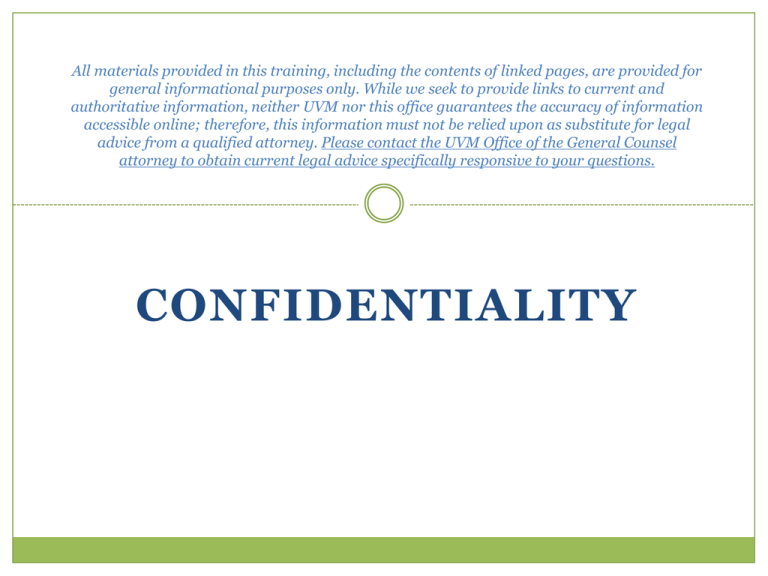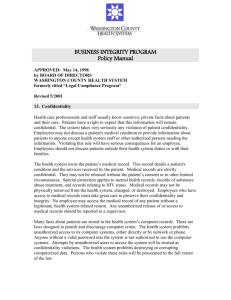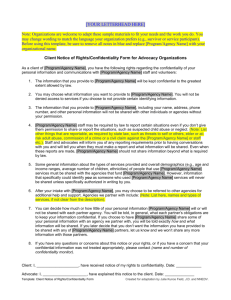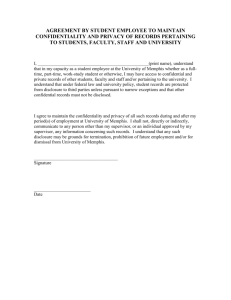Employment & Payroll Laws
advertisement

All materials provided in this training, including the contents of linked pages, are provided for general informational purposes only. While we seek to provide links to current and authoritative information, neither UVM nor this office guarantees the accuracy of information accessible online; therefore, this information must not be relied upon as substitute for legal advice from a qualified attorney. Please contact the UVM Office of the General Counsel attorney to obtain current legal advice specifically responsive to your questions. CONFIDENTIALITY Confidential Employee Information Confidential Employee Information Criminal Record Financial Information and Social Security Number Medical Information Must be maintained separately Includes family or household members Personal Information Address, telephone number, age, date of birth Test scores, disciplinary action, performance ratings Insurance Information Job Application Information Work history, education, reasons for leaving previous jobs Consequences for Inappropriate Disclosure Unauthorized disclosure of drug test results may limit UVM’s ability to present the results as evidence in judicial proceedings. Unauthorized disclosure of laboratory drug test results carries either a civil penalty of fines not less than $500 or more than $2,000 or a criminal penalty of a fine not less than $500 or than $1,000 and/or imprisonment for not more than six months Consequences for Inappropriate Disclosure Unauthorized disclosure of any confidential public health record is subject to a civil penalty fine of not less than $10,000 or more than $25,000, costs and attorney fees as determined by the court Unauthorized disclosure of confidential public nursing home information can result in a fine of not more than $500 and/or imprisonment for six months Consequences for Inappropriate Disclosure Unauthorized disclosure of DNA samples shall result in imprisonment for not more than one year and/or a fine of not more than $10,000 Civil actions for defamation, publicity given to private life, libel, intentional infliction of emotional distress, etc. Best Practices Best Practices It is okay to discuss information with a manager who has a “need to know.” Emergency exceptions – if information is necessary to protect the health or safety of the employee or others, it is OK to disclose. Best Practices Best Practices Remember it is the employee’s right to choose to whom, how, where and when to disclose confidential information (except in situations where it is necessary to disclose information to a manager for the manager to make an employment decision or in health and safety situations) When in doubt: discuss with your supervisor or your HRS Management Consultant. Confidentiality Quiz #1 Confidentiality Quiz #1 Should you ask Mark what the medical condition is? a. b. Yes No Answer: b. No Confidentiality Quiz #1 If Mark shares his medical condition with you, what should you do next? a. b. c. d. Inform Human Resources of his condition Out of concern, tell Mark’s coworkers of his condition Let your manager know of Mark’s condition Do nothing Answer: d. Do nothing Confidentiality Quiz#2 Confidentiality Quiz#2 Should you tell Cindy that you know about her husband’s job loss and depression? a. b. Yes No Answer: b. No Confidentiality Quiz#2 Should you focus on Cindy’s recent poor performance? a. b. Yes No Answer: a. Yes Confidentiality Quiz#3 Confidentiality Quiz#3 What should you do in this situation? a. b. c. d. Encourage Skip to tell his parents of his enrollment status Tell Skip’s parents directly that he is no longer enrolled Slip a note under Skip’s parents’ front door with the information Do nothing Answer: d. Do nothing Confidentiality Quiz#4 Confidentiality Quiz#4 Since you’re not at work, is it OK to share your own story about your team with your colleague? a. Yes b. No Answer: a. No





